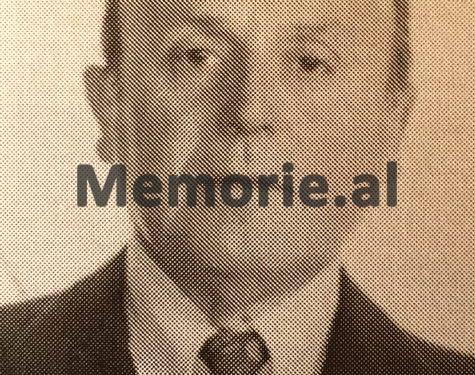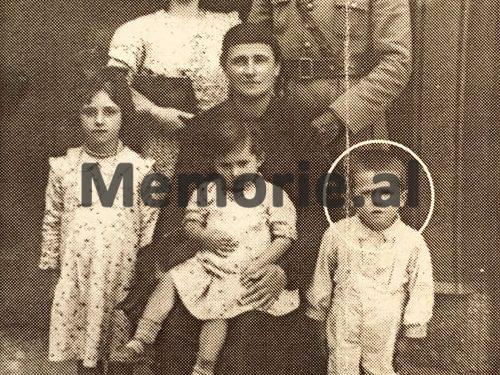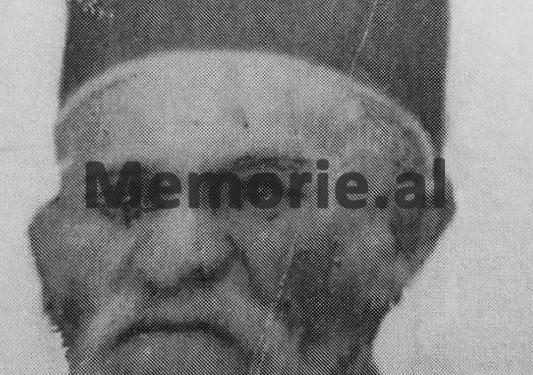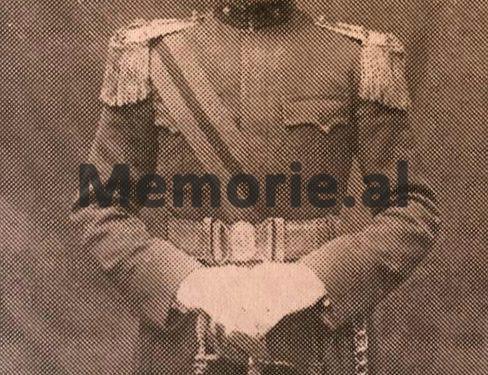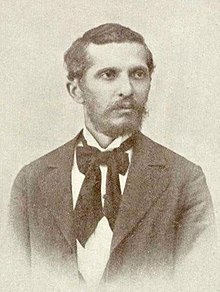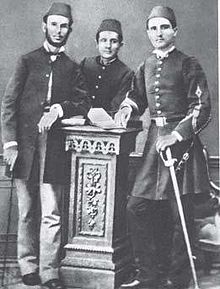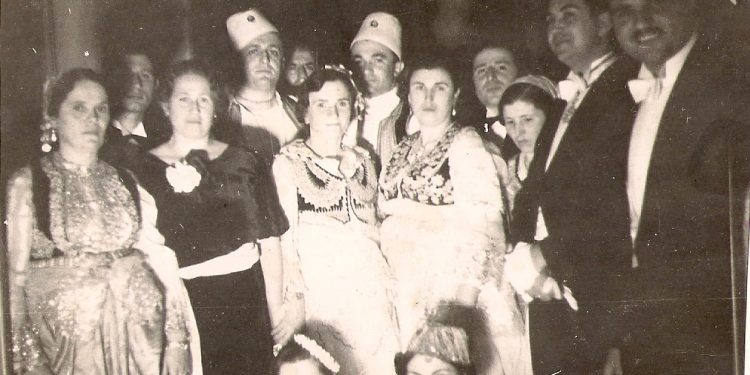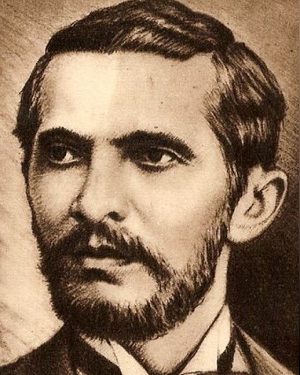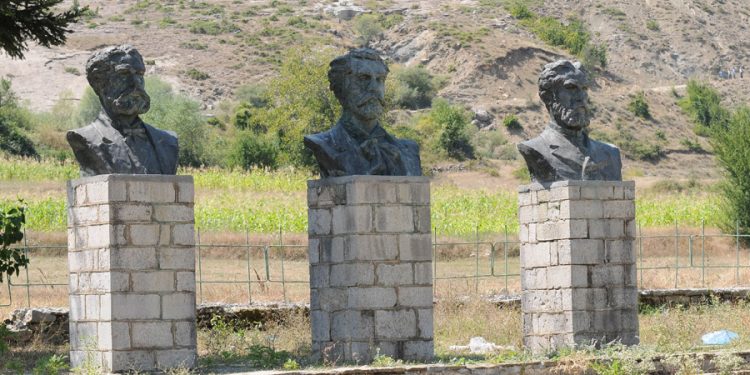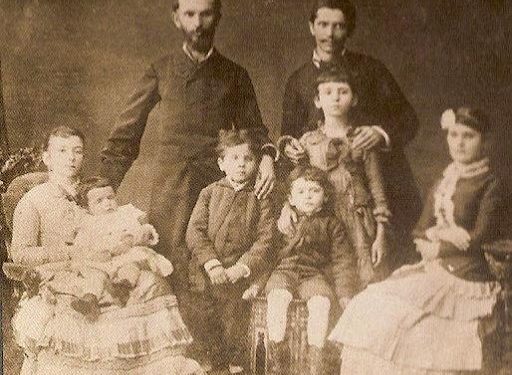Dashnor Kaloçi
Memorie.al publishes the unknown story of the Hoxha family originating from the village of Sanjollas in Kolonja, where its first, Hasan Hoxha, after graduating in Istanbul in a religious school, in 1882, by order of his close friend, Naim Frashërit, opened the first Albanian schools in the province of Dangëlli, Kolonjë, Përmet and Skrapar, about which Mihal Grameno would later write, in his book “Albanian Uprising” (pp. 159-177) where among others say: “Hasan Hoxha, one of the few patriots who secretly teaches the Albanian language to the people.” The testimony of his nephew, Agim Hoxha, about the history of his family and grandfather, Hasan, who, although he had made a great contribution to the spread of Albanian education in the South of Albania, cooperating closely with the three Frashëri brothers, the family of He was persecuted during the communist regime of Enver Hoxha, after his father, Riza Hoxha, graduated from the Military Academy in Rome and served as an officer in the Zog Monarchy.
Although my grandfather Hasan Hoxha was the first teacher to open Albanian schools in 1882 in the provinces of Dangëlli, Përmet and Kolonjë, according to the order given by his close friend Naim Frashëri, who also supplied him with Albanian books “In 1954, after I finished Pedagogy with a Gold Medal, I was not given the right to continue my higher studies, because my father, Rizai, had served for 15 years as a soldier of the Zog Monarchy.”
Speaks and testifies for the first time for Memorie.al, Agim Riza Hoxha, who tells the whole story of his grandfather, Hasan Hoxha, the closest man to Naim Frashëri, who with his message opened the first Albanian schools in the provinces of Kolonjë and Përmet, as well as the vicissitudes that followed his father, Riza, the former Kingdom captain who was educated at the Military Academy of Rome and during the years of the communist regime, worked in the Municipal Enterprise to earn a living. What is the history of Hasan Hoxha’s family and how were they treated during the years of the communist regime?
Opens schools with Naim Frashëri
The Hoxha family, or as it is otherwise known by the surname Topi, from whose trunk is also Agimi, originates from the village of Sanjollas in Kolonjë. Hasan Hoxha (Agim’s grandfather) is one of the first members of this family to make a big name, who was born in the village of Sanjollas in the district of Kolonjë in 1855, to Besim and Sheko. After finishing his studies at the Ruzhdie school in Erseka, Hasan went to Turkey and continued his studies at the “Idadie” in Istanbul, where he graduated as a priest. After that Hasan returned to his native village Sanjolla and at the request of Dervish Sheh Abdyl Aliçkaj, settled in the village of Frashër of Përmet, where it was one of the most heard Bektashi Tekkes in the whole South of the country. There in that village Hasan Hoxha married the daughter of Dervish Sheh Alicka, (Hysnijen) entering as a son-in-law in that family and then he went back to Greece to continue his studies in a Turkish religious school, in “Daire Muhalimi” (Normal ) of the Vilayet of Ioannina. After graduating and graduating as a teacher (imam for Madrasas), he returned to Albania, where he was appointed as a teacher at the Turkish school in the village of Frashër. At the time Hasan Hoxha was appointed a teacher in that village, he became closely associated with the Frashëri brothers, Abdylin Naim and Sami, and maintained the closest ties with Naim, with whom they had become brothers in the Frashëri Tekke by Baba Alushi who served there. Regarding this in his memoirs, Hasan Hoxha wrote: When Naimi and Samiu had returned from the school “Zosimea” in Ioannina for the summer holidays in Frashër, Baba Alushi asked them: what had they learned and what was said about our language Albanian. They shrugged their shoulders and said they knew nothing, because there in Ioannina no word was said about the language of our nation. At that time Baba Alushi said: ‘You or your sons, it is your duty to ask the professors in every case and at all times, about the language we speak and about our nation’. After that, Abdyli and Naimi wrote to Sami to send them some money to go to Rome and Paris, because only in their libraries and museums there were documents for which Baba Alushi advised them “.
Before the opening of the first Albanian school in Korça in 1887, by order of Naim Frashëri, who settled in Istanbul at the end of 1882, Hasan Hoxha together with Dervish Meleq Staravecka, were busy distributing the Albanian primer in the villages of the province of Dangëlli, Përmet and Kolonjë, as well as in some villages of Skrapar and Tepelena, where Hasani secretly taught the Albanian language to the villagers of those provinces. For this contribution that Hasan Hoxha gave to the spread of Albanian schools, at that time he received a letter of thanks from Naim Frashëri. who wrote to him from Istanbul: “I would be happy if I were like you there in Frashër, and teach those angels the letters of their mother tongue”.
After this letter that Hasan received from his close friend Naim Frashëri, in his memoirs he wrote: “From the exchange letter with Naim, as a young man I wanted to come to Istanbul with a job and be close to Naim, but the answer I received from him strengthened my convictions and I gave up the idea of going to Istanbul and continued to serve as a priest and teacher in the village of Frashër ”.
When the Young Turks came to power in Turkey, who allowed the opening of Albanian schools, Hasan Hoxha turned the schools of the provinces of Kolonja, Dëngëlli and Skrapar into Albanian, but that did not last long because the Young Turks again banned the Albanian schools. But even after this decision of the High Gate, the people of the province of Dangëlli raised funds and reopened the Albanian schools and Hasan Hoxha as an experienced teacher gave a great help to the teachers who were assigned to those schools. At that time the school was in the center of the village of Frashër and there the caravans coming from the distant road stopped and stopped. Given the position of the school, young people from the village often gathered there to listen to Baba Hasani, who spoke to them about the Albanian language. Although that school maintained the form established by the Ottoman government, in fact the Albanian language was secretly taught there by its teacher, Hasan Hoxha. Regarding Baba Hasani’s contribution to the opening of Albanian schools, Mihal Grameno also wrote in his book “Albanian Uprising” (pp. 159-177) where, among other things, he states: “Hasan Hoxha, one of the few patriots who teaches secretly the Albanian language to the people ”.
In a meeting with Abdyl Frashëri
During those years that Hasan Hoxha served in the Tekke of Frshëri, he was appointed secretary of that Tekke where Baba Alushi served and in 1879 when the meeting of the parish of Southern Albania was held there, which was convened on the initiative of Abdyl Bej Frashëri , Hasan was appointed secretary of that meeting. Regarding this, Hasan’s son, Riza Hoxha, wrote in his memoirs: “My father Hasan Hoxha was a participant in the meeting of the conference of the primacy of Southern Albania that was convened on the initiative of brothers Abdyl, Naim and Sami Frashëri, in March 1979 in the Teqe of Frashër, under the leadership of Baba Alushi. Delegates from all over Albania came there, so much so that the houses of Frashër were filled with their animals and some of them were left outside in the yards, being covered with birches and guna from the snow that started to fall. This meeting, after taking decisions on the shape of the flag, the Abe and the way of writing, as well as the vilayet that would require freedom, elected delegates to Europe, Abdyl Frashëri and Mehmet Vrioni, to protest the unjust decision of the Berlin Congress of 1878 that pruned the lands of the Albanian Nation. At that meeting most of the delegates wanted the Albanian words and the Turkish letter and writing to start from the right, because that would be auspicious. But Abdyl, explaining how Skanderbeg removed his sword from the left, begged the assembly to leave the Latin script for ease of writing. This proposal was accepted by all with loud applause. The decisions of this meeting and their signatures were written and pasted on the papers with soup flour in a ball of cloth and were placed in the tombs of the Tekke, but unfortunately they were burned in 1914 by the Greek andartes “.
Hasan Hoxha’s contribution to the spread of Albanian schools at that time was highly appreciated not only by the inhabitants of the provinces of Dangëlli, Përmet, Kolonjë and Skrapar where he served as a teacher, but also by many patriots of that time. One of them was Sami Frashëri, who among other things wrote: “However, we can say that Përmeti, Dangëllia and Skrapari, are those places that have spread the Albanian language more. In Frashër, not now, but for years the teaching of Albanian has flourished. Boys, old men, women and maids, Muslims and Christians, in that small mountain town, but big by name, that everyone knows how to write beautiful Albanian ”.
During those years that Hasan Hoxha served in the Frshëri Tekke, he made a great contribution not only as a teacher who opened the first Albanian schools, but also as a wise man who took care of the reconciliation of grievances, exposing the many enmities that the inhabitants had of Dangëlli and Përmet. In the first years of the twentieth century, the Frashër Teqe became one of the main strongholds of the Çerçiz Topulli and Mihal Grameno gang, and in 1910, after the Congress of the Monastery, Hasan Hoxha gave a lecture at a rally organized in Përmet. in honor of that Congress. After the Declaration of Independence, Hasan stayed for some time in Berat and then returned again to Frashër and continued his work as a teacher until his death on January 25, 1925 and was buried with the greatest honors in the Frashër Tekke, where he served for 50 years.
Son Rizai, Captain of the Bird Monarchy
Hasan Hoxha had two brothers, Rushan and Halit, who was killed by Greek andarts in 1914 leaving four orphaned children. The two sons, Riza and Arshin, were taken by Hasan and raised by his children, as their mother also died in the lowlands of Vlora where they had gone to hide from the Greek andartes who then burned Kolonja. Regarding this, his son, Agimi testifies: “Father Rizai, after finishing the school in Frashër which was opened by his grandfather Hasani who he knew as a father, came to Tirana and with the help of the Minister of War, Ali Riza Kolonjë, started the school of Officer Completion which he finished with high results. After that, with the help of Ali Riza Kolonja, the father went to study in Italy, where in 1927 he graduated from the Military Academy of Rome in the Infantry. After graduating in Italy, Rizai returned to Albania and was appointed as a lecturer at the Royal School of Officers in Tirana, and then served in the Infantry units in Elbasan, Mat, Malësi e Madhe, Korça and Berat. After serving in these districts, around 1936, by decree of King Zog, Rizai returned to Tirana as an officer in the Recruitment Branch. There he worked until 1939, when together with several other officers he went to Durrës to help Abaz Kupi, to organize the resistance against the Italian fascist aggression. Even after the fascist occupation, Rizai remained as an officer in the Tirana Recruitment Branch, where he worked until 1943, when Italy capitulated and with the arrival of the Germans he resigned and refused to serve as an officer. During the years of occupation, in our house in the New Neighborhood on Gjon Muzaka Street, some exponents of the Anti-Fascist Movement took refuge, such as Liri Kolaneci, Vehip Lumani, Vera Tetova (Malo), etc., and in November 1944 “When we were fighting for the liberation of Tirana, our house became a base for partisans who put a machine gun there to machine-gun the Lapraka Aviation Field,” Agimi recalls of his father Rizain, who served as an officer in the Zog Monarchy and the house that became a partisan base.
Arrest and persecution
A few days before the liberation of Tirana, Riza Hoxha was arrested by the communists together with his fellow former officers of the Monarchy, Hamza Luzati, Rami Bujari and the Bilbil brothers and Hodo Taçi, who kept them detained for several days at the Bristol Hotel. . In this regard, Agimi testifies: “After the communists shot a group of detainees who had been kept in that hotel, the father and some of his friends, former officers of the Monarchy, were able to escape only after the intervention of Major General Dali Ndreu, with whom they had worked together as officers of the Bird Monarchy. After the end of the war, in 1946 his father was deprived of the officer’s pension that he had received until then, because he had not fought as a partisan. After that, to earn a living, he was forced to work as a storekeeper and then in the Municipal Enterprise, until he retired in 1966. Throughout the communist regime, his father did not leave the house at all because he was guarded. that he was not arrested because he had been an officer of Zog and was looked down upon by that regime. In 1954, when I graduated from the Pedagogical School with a Gold Medal, I was not deprived of the right to continue my high school education because I had Zog’s father an officer and the scholarship planned for me in Bulgaria was given to another person. Only then, with the change of some political conjunctures, was I able to finish school by correspondence “, concludes his story, Agim Hoxha, on the vicissitudes that his family and his father, Rizai, whose father Hasan Hoxha went through, with the message and help of Naim Frashëri, had opened the first Albanian schools in Albania./Memorie.al




